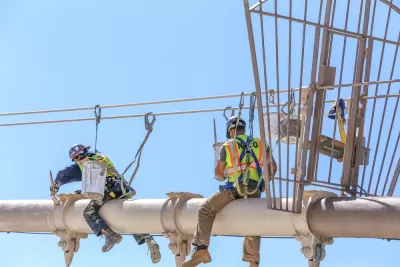A new book details what planners already know: cost estimates for major infrastructure projects are usually a farce. Another book foretells just how much new infrastructure will be needed in the coming waves of climate migration.

“Bent Flyvbjerg’s ‘iron law of megaprojects’ holds that only 47% of projects finish on-budget; 8.5% finish on-budget and on-time; and 0.5% finish on-budget, on-time, and deliver their intended benefits. Among the most perilous categories: nuclear storage, Olympic Games, dams, and information technology projects. Projects friendly to urban planners, like bus rapid transit, rail, and buildings don’t fare much better.”
“Whether they serve the public sector or private sector, they all have over a 70% chance of cost overruns. And ‘over-budget’ doesn’t mean a dollar or two. In many cases, overages reach 50% or 100% of a project’s original budget.”
“This is why we can't have nice things. Or, rather, this is why we can't have nicer, cheaper, and more timely nice things.”
“Displacement, by journalist Jake Bittle, which describes the type of geographic displacement that the early effects of climate change are causing and foretells the dramatic impacts of climate change a few decades from now.”
“The connection between the two books is chilling.... Major projects, and many of them, are going to be required both to mute the effects of climate change in vulnerable places and to accommodate the migrants in resilient places.”
FULL STORY: Book Review: Why We Can't Have Nice Things

Planetizen Federal Action Tracker
A weekly monitor of how Trump’s orders and actions are impacting planners and planning in America.

Congressman Proposes Bill to Rename DC Metro “Trump Train”
The Make Autorail Great Again Act would withhold federal funding to the system until the Washington Metropolitan Area Transit Authority (WMATA), rebrands as the Washington Metropolitan Authority for Greater Access (WMAGA).

The Simple Legislative Tool Transforming Vacant Downtowns
In California, Michigan and Georgia, an easy win is bringing dollars — and delight — back to city centers.

The States Losing Rural Delivery Rooms at an Alarming Pace
In some states, as few as 9% of rural hospitals still deliver babies. As a result, rising pre-term births, no adequate pre-term care and harrowing close calls are a growing reality.

The Small South Asian Republic Going all in on EVs
Thanks to one simple policy change less than five years ago, 65% of new cars in this Himalayan country are now electric.

DC Backpedals on Bike Lane Protection, Swaps Barriers for Paint
Citing aesthetic concerns, the city is removing the concrete barriers and flexposts that once separated Arizona Avenue cyclists from motor vehicles.
Urban Design for Planners 1: Software Tools
This six-course series explores essential urban design concepts using open source software and equips planners with the tools they need to participate fully in the urban design process.
Planning for Universal Design
Learn the tools for implementing Universal Design in planning regulations.
Smith Gee Studio
City of Charlotte
City of Camden Redevelopment Agency
City of Astoria
Transportation Research & Education Center (TREC) at Portland State University
US High Speed Rail Association
City of Camden Redevelopment Agency
Municipality of Princeton (NJ)





























